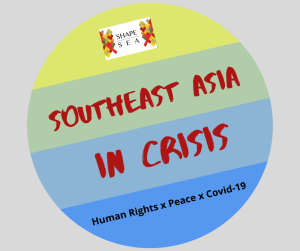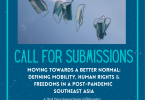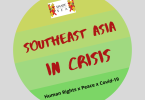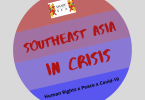Miguel Paolo P. ReyesUniversity Research Associate, Third World Studies Center, College of Social Sciences and Philosophy, University of the Philippines Diliman
 Nono* is a garbage collector. However, unlike garbage collectors employed by local government units, who roam the streets aboard garbage trucks, Nono pushes a wooden pushcart thrice a week through the alleys of a low-cost housing bloc, often with his young children as helpers. He serves as an intermediary between the residents of the four-story housing units and the state ™s garbage collectors, bringing down garbage and sorting them, selling whatever he can to junk dealers. Each household in the bloc gives him what amounts to a convenience fee; some leave the equivalent of USD 00.40 out with the garbage, others slightly more or even less.During the current pandemic-induced Enhanced Community Quarantine (ECQ) over the entire island of Luzon, Nono continues to work, with at least one child helper. Some of the residents have been providing them with food in addition to money, knowing that the ECQ has made it generally difficult to procure necessities. However, they work without protective equipment besides cloth masks. Among the garbage that they handle are discarded surgical masks, used disposable utensils, and soiled disposable diapers; their potential exposure to SARS-CoV-2 is very high. Yet now, as before, Nono does not receive any form of hazard pay.Stella is employed by a laundry shop near the abovementioned housing bloc. Besides doing laundry, she and her co-workers also offer home-cleaning services. Before the ECQ, her income was stable, though still within the same lower-class range as Nono ™s. Her employer remits the mandatory social security contribution deducted from her earnings. However, she claimed that the company she works for struggled to make a profit (like her fellow washer-cleaners, she also functioned as a cashier).On the night before the ECQ took effect, Stella ™s laundry shop announced on social media that they would be closing indefinitely. They thought that they could open after a week, but the ECQ guidelines released by the national government does not consider laundry shops as essential services. She has been managing thus far; without any profit, one wonders how long she can receive support, if any, from her employer. One time, she went to a customer near her residence to receive a small cash donation. With the ECQ recently being extended, she may soon be more reliant on such charity. She claimed that she was not given relief goods by the officials of the barangay (village) where she resides because she lived alone; families only, she was told.Ruth lives with her family, which includes her two-year-old daughter, in a barangay near Stella ™s. She is one of the custodial staff in a nearby government office. However, she is not a government employee. She works for a manpower agency subcontracted by the government office for custodial services. The contract duration is usually one year. If another agency wins the bidding for the next one-year contract, the unit in the office where Ruth is currently assigned must petition for her to stay on as their custodial staff, or else she may find herself assigned elsewhere, or worse, she may become a reliever, given work ”and a paycheck ”only when a worker with an assignment is absent.As a daily wage earner, she used to work even during holidays. With work suspended because of the ECQ, she is relying on various forms of aid. As of this writing, she says she has received relief goods only once from barangay officials. Her family receives some funds from the state ™s conditional cash transfer program, thus is qualified for additional government assistance, which they have yet to receive. Moreover, she says she has not received her last salary. She has received some financial assistance from the employees in the office where she is assigned.All three suffer from socioeconomic insecurity exacerbated by the pandemic and the state ™s inadequate responses thereto. Their precariousness is due to a systemic undervaluation of their work. It is appalling that they currently rely on individual generosity and delayed and/or arbitrarily distributed government aid. As has become clear to others, the very least that should be provided to the likes of Nono, Stella, and Ruth is a basic income ”sufficient so that their survival at any time need not depend on self-endangerment and seasonal charity.*All the names of the actual individuals whose current circumstances are factually described here have been changed for privacy reasons. The information about them was gathered from brief face-to-face conversations, text/direct messages, and authoritative second-hand accounts. References:Department of Social Welfare and Development, Department of Labor and Employment, Department of Trade and Industry, Department of Agriculture, Department of Finance, Department of Budget and Management, and Department of the Interior and Local Government. (2020, March 29). Special guidelines on the provision of social amelioration measures by the Department of Social Welfare and Development, Department of Labor and Employment, Department of Trade and Industry, Department of Agriculture, Department of Finance, Department of Budget and Management, and Department of the Interior and Local Government to the most affected residents of the areas under enhanced community quarantine .Kabilang, G. (2020, March 21). Gov ™t allows only one person per household to leave home; other guidelines for ECQ. Manila Bulletin. Retrieved from https://news.mb.com.ph/2020/03/18/govt-allows-only-one-person-per-household-to-leave-home-other-guidelines-for-ecq/Medialdea, S. (2020, March 16). Community quarantine over the entire Luzon and further guidelines for the management of the Coronavirus Disease 2019 (COVID-19) situation . Office of the President of the Philippines.Tharoor, I. (2020, April 10). The pandemic strengthens the case for universal basic income. The Washington Post. Retrieved from https://www.washingtonpost.com/world/2020/04/09/pandemic-strengthens-case-universal-basic-income/Zeballos-Roig, J. (2020, April 7). Spain is moving to establish permanent basic income in the wake of the coronavirus pandemic. Business Insider. Retrieved from https://www.businessinsider.com/spain-universal-basic-income-coronavirus-yang-ubi-permanent-first-europe-2020-4
Nono* is a garbage collector. However, unlike garbage collectors employed by local government units, who roam the streets aboard garbage trucks, Nono pushes a wooden pushcart thrice a week through the alleys of a low-cost housing bloc, often with his young children as helpers. He serves as an intermediary between the residents of the four-story housing units and the state ™s garbage collectors, bringing down garbage and sorting them, selling whatever he can to junk dealers. Each household in the bloc gives him what amounts to a convenience fee; some leave the equivalent of USD 00.40 out with the garbage, others slightly more or even less.During the current pandemic-induced Enhanced Community Quarantine (ECQ) over the entire island of Luzon, Nono continues to work, with at least one child helper. Some of the residents have been providing them with food in addition to money, knowing that the ECQ has made it generally difficult to procure necessities. However, they work without protective equipment besides cloth masks. Among the garbage that they handle are discarded surgical masks, used disposable utensils, and soiled disposable diapers; their potential exposure to SARS-CoV-2 is very high. Yet now, as before, Nono does not receive any form of hazard pay.Stella is employed by a laundry shop near the abovementioned housing bloc. Besides doing laundry, she and her co-workers also offer home-cleaning services. Before the ECQ, her income was stable, though still within the same lower-class range as Nono ™s. Her employer remits the mandatory social security contribution deducted from her earnings. However, she claimed that the company she works for struggled to make a profit (like her fellow washer-cleaners, she also functioned as a cashier).On the night before the ECQ took effect, Stella ™s laundry shop announced on social media that they would be closing indefinitely. They thought that they could open after a week, but the ECQ guidelines released by the national government does not consider laundry shops as essential services. She has been managing thus far; without any profit, one wonders how long she can receive support, if any, from her employer. One time, she went to a customer near her residence to receive a small cash donation. With the ECQ recently being extended, she may soon be more reliant on such charity. She claimed that she was not given relief goods by the officials of the barangay (village) where she resides because she lived alone; families only, she was told.Ruth lives with her family, which includes her two-year-old daughter, in a barangay near Stella ™s. She is one of the custodial staff in a nearby government office. However, she is not a government employee. She works for a manpower agency subcontracted by the government office for custodial services. The contract duration is usually one year. If another agency wins the bidding for the next one-year contract, the unit in the office where Ruth is currently assigned must petition for her to stay on as their custodial staff, or else she may find herself assigned elsewhere, or worse, she may become a reliever, given work ”and a paycheck ”only when a worker with an assignment is absent.As a daily wage earner, she used to work even during holidays. With work suspended because of the ECQ, she is relying on various forms of aid. As of this writing, she says she has received relief goods only once from barangay officials. Her family receives some funds from the state ™s conditional cash transfer program, thus is qualified for additional government assistance, which they have yet to receive. Moreover, she says she has not received her last salary. She has received some financial assistance from the employees in the office where she is assigned.All three suffer from socioeconomic insecurity exacerbated by the pandemic and the state ™s inadequate responses thereto. Their precariousness is due to a systemic undervaluation of their work. It is appalling that they currently rely on individual generosity and delayed and/or arbitrarily distributed government aid. As has become clear to others, the very least that should be provided to the likes of Nono, Stella, and Ruth is a basic income ”sufficient so that their survival at any time need not depend on self-endangerment and seasonal charity.*All the names of the actual individuals whose current circumstances are factually described here have been changed for privacy reasons. The information about them was gathered from brief face-to-face conversations, text/direct messages, and authoritative second-hand accounts. References:Department of Social Welfare and Development, Department of Labor and Employment, Department of Trade and Industry, Department of Agriculture, Department of Finance, Department of Budget and Management, and Department of the Interior and Local Government. (2020, March 29). Special guidelines on the provision of social amelioration measures by the Department of Social Welfare and Development, Department of Labor and Employment, Department of Trade and Industry, Department of Agriculture, Department of Finance, Department of Budget and Management, and Department of the Interior and Local Government to the most affected residents of the areas under enhanced community quarantine .Kabilang, G. (2020, March 21). Gov ™t allows only one person per household to leave home; other guidelines for ECQ. Manila Bulletin. Retrieved from https://news.mb.com.ph/2020/03/18/govt-allows-only-one-person-per-household-to-leave-home-other-guidelines-for-ecq/Medialdea, S. (2020, March 16). Community quarantine over the entire Luzon and further guidelines for the management of the Coronavirus Disease 2019 (COVID-19) situation . Office of the President of the Philippines.Tharoor, I. (2020, April 10). The pandemic strengthens the case for universal basic income. The Washington Post. Retrieved from https://www.washingtonpost.com/world/2020/04/09/pandemic-strengthens-case-universal-basic-income/Zeballos-Roig, J. (2020, April 7). Spain is moving to establish permanent basic income in the wake of the coronavirus pandemic. Business Insider. Retrieved from https://www.businessinsider.com/spain-universal-basic-income-coronavirus-yang-ubi-permanent-first-europe-2020-4





